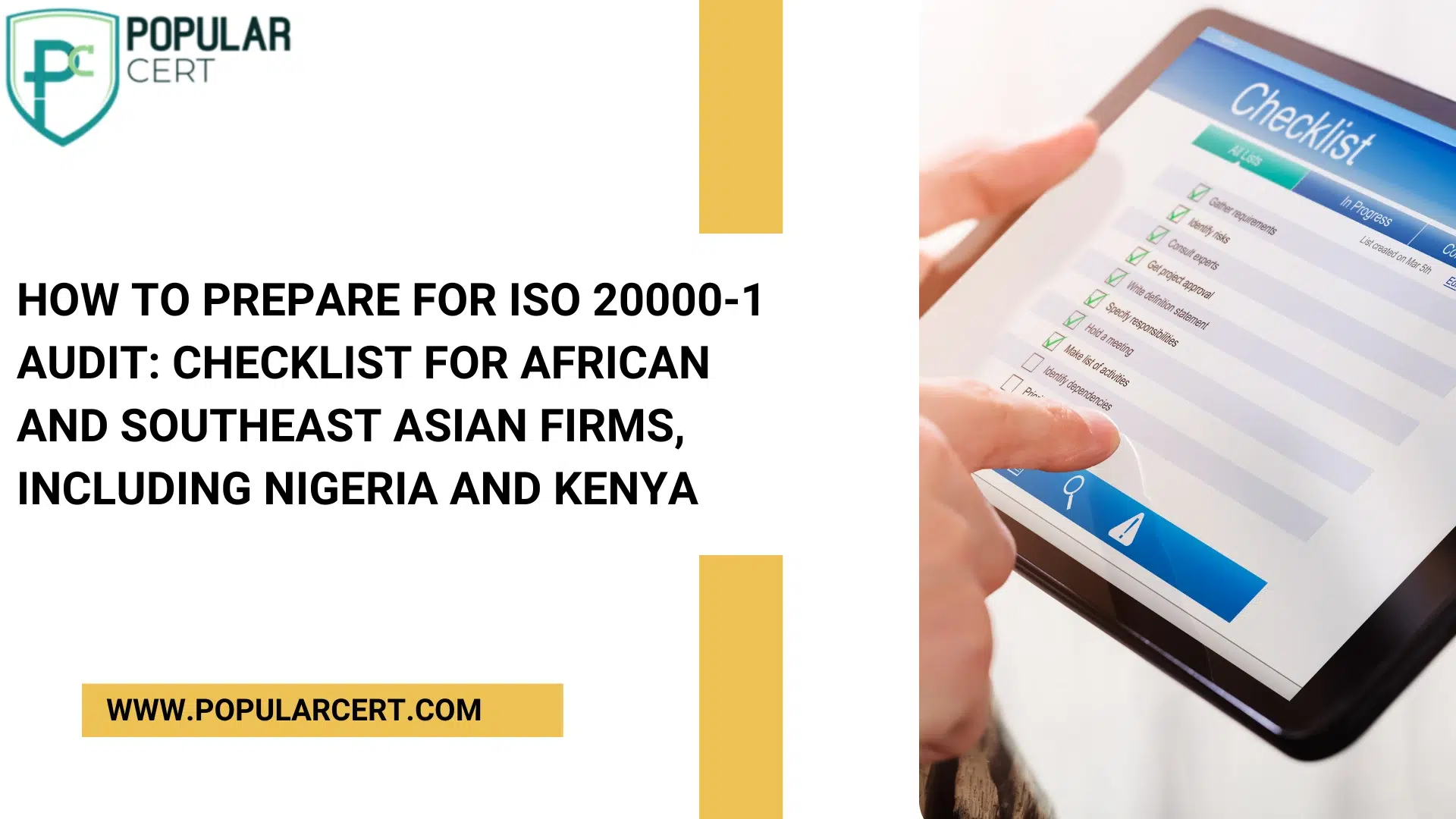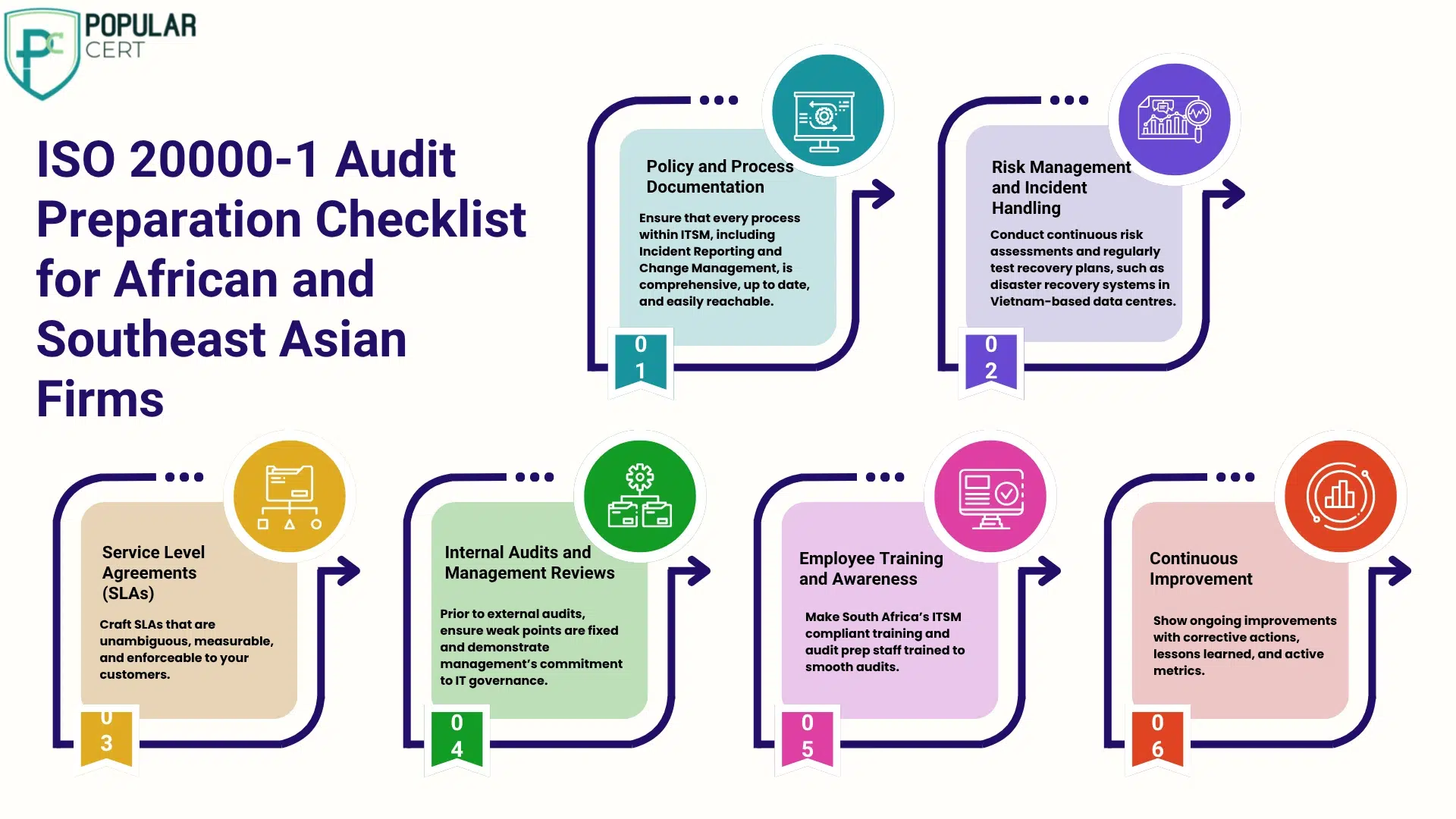How to Prepare for ISO 20000-1 Audit: Checklist for African and Southeast Asian Firms, including Nigeria and Kenya

Introduction
Picture a telecommunication innovator based in Nairobi on the verge of debuting a mobile banking app that targets millions of the unbanked. The marketing campaigns are up and running, potential clients are waiting impatiently, and the investors are all eyes. But on the big day, app launch day, the poor management of IT services crashes the system and the app goes offline for hours. Users are put off and the potential growth of the company is stopped in its tracks.
And, this isn’t a myth. The hopeless, unwatchable, poorly servable IT services of the company will be a problem in most geographical locations in the continent, that is for sure. Kenya is the global leader in mobile adoption, with over 70% of the population using mobile money as M-Pesa. The fintech industry is one of the fastest growing on the continent and the sector in Nigeria alone has garnered over 1.2 billion dollars in the last three years.
For companies and individuals in the most difficult of environments, preparing for an ISO 20000-1 audit in Nigeria is not a question of compliance, it is a question of life and death.
How to Prepare for ISO 20000-1 Audit and What It Is?
ISO 20000-1 is termed internationally recognized standard for IT Service Management (ITSM). It establishes all the requirements for the setting, implementing, and maintaining improving ITSM system continually.
As for the preparation for audit, one needs to understand the auditors do not limit to the documents only. For example, they assess if the policies regarding the IT services are applied, if the incident responses are timely and effective, and if the organization can prove the service is being improved.
The IT services for oil and gas in Lagos and the telecom operator in Manila, for instance, need to show that their IT systems can deal with service disruptions and downtime, and still satisfy customer needs. If not, the audit can expose overwrought gaps that can lead to loss of certification, reputation, and unprecedented regulatory fines.
ISO 20000-1 Audit Preparation Checklist for African and Southeast Asian Firms
When it comes to preparing for an ISO 20000-1 audit, it is important to know that it starts with the alignment of IT services with the objectives of the business, demonstrating the value of consistency and reliability, and goes way beyond just ticking boxes. Here is a practical checklist:

Types Of Certification
- ISO Certification
- ISO 9001 Certification
- ISO 14001 Certification
- ISO 45001 Certification
- ISO 22000 Certification
- ISO 27001 Certification
- ISO 17025 Certification
- ISO 13485 Certification
- ISO 20000-1 Certification
- ISO 22301 Certification
- ISO 50001 Certification
- ISO 37001 Certification
- IATF 16949 Certification
- ISO 29001 Certification
- ISO 31000 Certification
- ISO 20121 Certification
- ISO 10002 Certification
- ISO 41001 Certification
Get Free Consultation
Our Clients


















ISO 20000-1 Certification in Nigeria and Kenya: Localized Checklist
Nigeria.
Nigeria represents Africa’s fintech hub with startups receiving billions of foreign investments. For Nigerian firms, IT service management ceases to become purely a technical requirement, and becomes a growth enabler. Auditors will expect:
- Effective data governance, especially in the financial services sector.
- Uptime management during high-volume transactional periods.
- Compliance with the Central Bank of Nigeria digital services regulations.
Example: Lagos fintech which handles thousands of daily transactions will have to provide proof of capability to auditors of incident management SLA resolution, down to the SLA of the incident response team.
Kenya.
Kenya’s economy is greatly reliant on its mobile banking ecosystem. With over 70% of the population relying on mobile money, even a few minutes of service interruptions create a ripple effect and will disrupt millions. Auditors will expect:
- Evidence of SLA monitoring and reporting.
- Documented protocols for handling incidents of banking services.
- Data security which meets the required regulatory standards.
Example: A Nairobi based Telecom has to provide service availability proof and service SLA during high transactional loads to regulators and auditors.
Risks of Poor Audit Preparation
You can get your ISO 20000-1 certification in Kenya with little hassle, but poor preparation can lead to:
Downtime and Revenue Loss
- The financial impact of failures during key business periods can be devastating. A business process outsourcing company in the Philippines, for instance, can lose international clients if it fails to meet SLA commitments during downtimes.
Damaged Investor and Customer Trust
- In Nigeria’s Fintech sector, poorly governed IT systems will cause lost audit opportunities to attract billions of investments and to grow the customer base. Customers and investors will shift to the competition.
Regulatory Penalties in Sensitive Sectors
- Firms in finance, telecom, and healthcare are only a few of the industries prone to heavy penalties for poor management of IT services.
- In Nigeria, unlicensed fintech businesses are unable to grow due to the delays that poorly governed IT systems cause.
- In Kenya, telecom providers that lack IT systems to support mobile money and prove regulatory compliance will face fines as millions of citizens depend on the service.
Global Competitiveness Loss
- Firms in Africa and Southeast Asia compete for the same international contracts. Without certification, their global tendering opportunities are lost.
Conclusion: Poor preparation does not only lead to an unsuccessful audit, but also lost opportunities for growth, stalled projects, and potential unpaid debts.
How Popularcert Helps with ISO 20000-1 Certification
The process of audit preparation can be complicated. That does not mean it has to be complicated and expensive. Popularcert provides comprehensive support to make certain that organizations are completely audit-ready:
- Gap analysis and ITSM documentation support
- Pre-audit exercises and simulation audits
- Regional knowledge of Africa and Southeast Asia and sectors including fintech, telecom, and BPO.
- Assistance through the entire certification process.
Through Popularcert, firms do not only manage audits. They use the opportunity to reinforce their IT systems in preparation for future growth.
Conclusion
The risk of poor audit preparation is largely underestimated. In Africa and Southeast Asia, it is dangerous. For Nigerian fintechs, Kenyan telecoms, and Filipino BPOs, the ISO 20000-1 audit is crucial. Missing it leads to downtimes, poorly timed licenses, reduced investor confidence, regulatory fines, and absconded trust.
Don’t allow an audit failure to break your business. Reach out to Popularcert and prepare for ISO 20000-1 certification. Support your business continuity and ensure your reputation is not compromised.
GET A FREE CONSULTATION NOW
FAQs
What documents are required for ISO 20000-1 audit preparation?
Policies, SLAs, incident logs, risk assessments, training records, and continual improvement evidence.
How long does it take to prepare for ISO 20000-1 certification?
Depending on IT service maturity, typically 3–6 months with proper guidance.
What are the top challenges firms in Nigeria and Kenya face during audits?
Lack of documentation, inadequate training, and weak SLA monitoring.
Can ISO 20000-1 benefit non-IT industries?
Yes, any industry with IT-driven services — healthcare, telecom, finance, education — benefits from stronger IT service management.
How does Popularcert assist in ISO 20000-1 audit readiness?
From gap analysis to documentation, pre-audit training, and final certification support, Popularcert ensures smooth and successful audits.
